ENTREPRENEURSHIP & SMALL BUSINESS Report - Semester 1, University
VerifiedAdded on 2020/10/04
|20
|5990
|371
Report
AI Summary
This report provides a comprehensive overview of entrepreneurship and small business ventures. It begins by defining entrepreneurship and exploring different types of ventures, including small business, scalable business, large business, and social entrepreneurship. The report then delves into the typologies of entrepreneurship, such as corporate, public sector, and survival typologies, highlighting their characteristics and related ventures. A comparison of the similarities and differences among various entrepreneurship ventures is also presented. Furthermore, the report examines the impact of small businesses on the economy and the importance of small businesses in social economic growth. It also identifies the characteristics and traits of successful entrepreneurs and reflects on the influence of entrepreneurial personality on motivation and mindset. Finally, the report concludes with a real-life example of entrepreneurship.

ENTREPRENEURSHIP &
SMALL BUSINESS
SMALL BUSINESS
Paraphrase This Document
Need a fresh take? Get an instant paraphrase of this document with our AI Paraphraser

Table of Contents
INTRODUCTION...........................................................................................................................3
TASK 1............................................................................................................................................3
P1 Different types of entrepreneur ventures and the typology of entrepreneurship ventures.....3
P2 Similarities and difference among the different entrepreneurship ventures..........................5
TASK 2............................................................................................................................................7
P3 Impact of macro & small business on economy with relevant data......................................7
P4 Importance of small business in social economic growth.....................................................9
TASK 3..........................................................................................................................................11
P5 Characteristics & traits of successful entrepreneur..............................................................11
P6 Reflection of Entrepreneurial Personality on entrepreneurial motivation and mindset.......12
TASK 4..........................................................................................................................................14
P7 Real Example of Entrepreneurship......................................................................................14
CONCLUSION..............................................................................................................................15
REFERENCES..............................................................................................................................16
INTRODUCTION...........................................................................................................................3
TASK 1............................................................................................................................................3
P1 Different types of entrepreneur ventures and the typology of entrepreneurship ventures.....3
P2 Similarities and difference among the different entrepreneurship ventures..........................5
TASK 2............................................................................................................................................7
P3 Impact of macro & small business on economy with relevant data......................................7
P4 Importance of small business in social economic growth.....................................................9
TASK 3..........................................................................................................................................11
P5 Characteristics & traits of successful entrepreneur..............................................................11
P6 Reflection of Entrepreneurial Personality on entrepreneurial motivation and mindset.......12
TASK 4..........................................................................................................................................14
P7 Real Example of Entrepreneurship......................................................................................14
CONCLUSION..............................................................................................................................15
REFERENCES..............................................................................................................................16
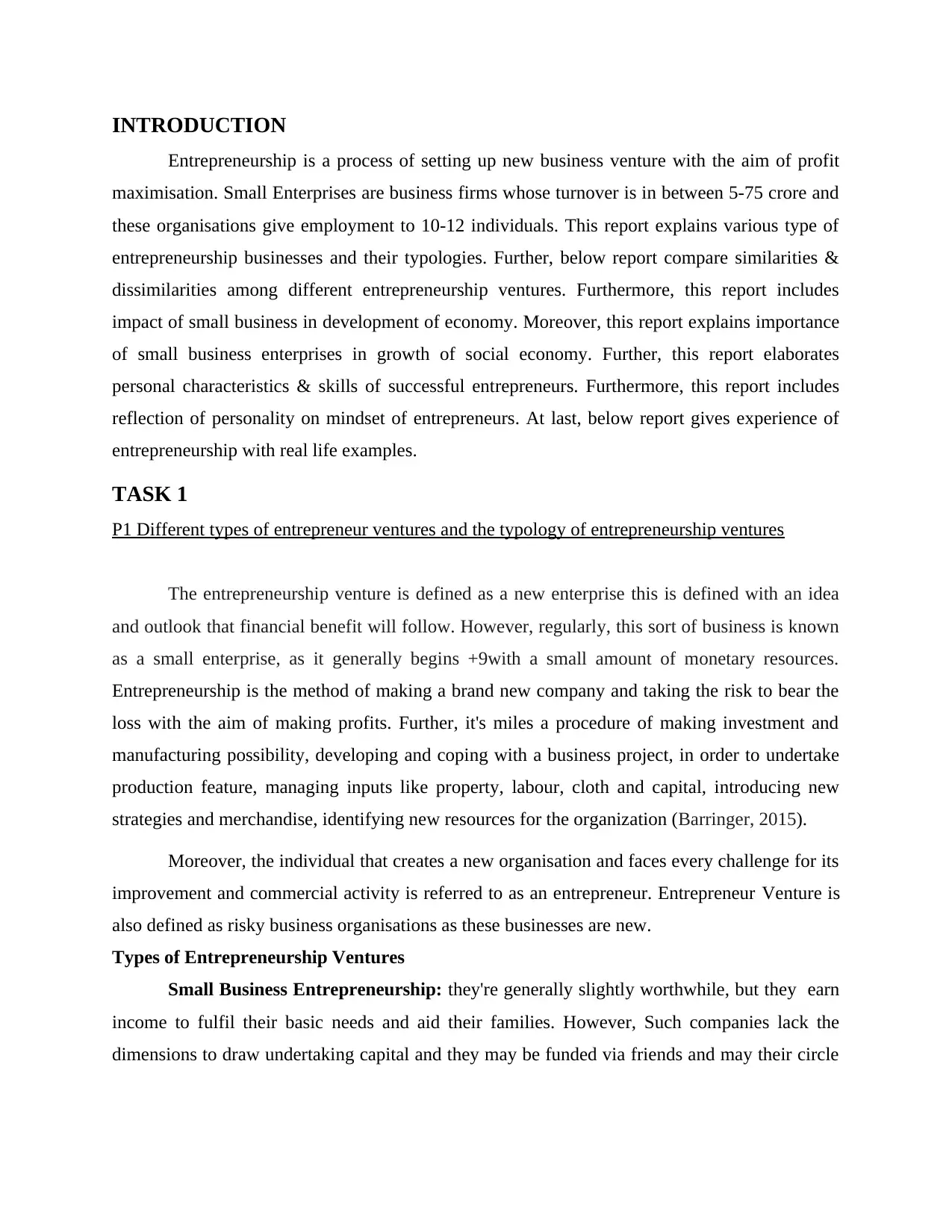
INTRODUCTION
Entrepreneurship is a process of setting up new business venture with the aim of profit
maximisation. Small Enterprises are business firms whose turnover is in between 5-75 crore and
these organisations give employment to 10-12 individuals. This report explains various type of
entrepreneurship businesses and their typologies. Further, below report compare similarities &
dissimilarities among different entrepreneurship ventures. Furthermore, this report includes
impact of small business in development of economy. Moreover, this report explains importance
of small business enterprises in growth of social economy. Further, this report elaborates
personal characteristics & skills of successful entrepreneurs. Furthermore, this report includes
reflection of personality on mindset of entrepreneurs. At last, below report gives experience of
entrepreneurship with real life examples.
TASK 1
P1 Different types of entrepreneur ventures and the typology of entrepreneurship ventures
The entrepreneurship venture is defined as a new enterprise this is defined with an idea
and outlook that financial benefit will follow. However, regularly, this sort of business is known
as a small enterprise, as it generally begins +9with a small amount of monetary resources.
Entrepreneurship is the method of making a brand new company and taking the risk to bear the
loss with the aim of making profits. Further, it's miles a procedure of making investment and
manufacturing possibility, developing and coping with a business project, in order to undertake
production feature, managing inputs like property, labour, cloth and capital, introducing new
strategies and merchandise, identifying new resources for the organization (Barringer, 2015).
Moreover, the individual that creates a new organisation and faces every challenge for its
improvement and commercial activity is referred to as an entrepreneur. Entrepreneur Venture is
also defined as risky business organisations as these businesses are new.
Types of Entrepreneurship Ventures
Small Business Entrepreneurship: they're generally slightly worthwhile, but they earn
income to fulfil their basic needs and aid their families. However, Such companies lack the
dimensions to draw undertaking capital and they may be funded via friends and may their circle
Entrepreneurship is a process of setting up new business venture with the aim of profit
maximisation. Small Enterprises are business firms whose turnover is in between 5-75 crore and
these organisations give employment to 10-12 individuals. This report explains various type of
entrepreneurship businesses and their typologies. Further, below report compare similarities &
dissimilarities among different entrepreneurship ventures. Furthermore, this report includes
impact of small business in development of economy. Moreover, this report explains importance
of small business enterprises in growth of social economy. Further, this report elaborates
personal characteristics & skills of successful entrepreneurs. Furthermore, this report includes
reflection of personality on mindset of entrepreneurs. At last, below report gives experience of
entrepreneurship with real life examples.
TASK 1
P1 Different types of entrepreneur ventures and the typology of entrepreneurship ventures
The entrepreneurship venture is defined as a new enterprise this is defined with an idea
and outlook that financial benefit will follow. However, regularly, this sort of business is known
as a small enterprise, as it generally begins +9with a small amount of monetary resources.
Entrepreneurship is the method of making a brand new company and taking the risk to bear the
loss with the aim of making profits. Further, it's miles a procedure of making investment and
manufacturing possibility, developing and coping with a business project, in order to undertake
production feature, managing inputs like property, labour, cloth and capital, introducing new
strategies and merchandise, identifying new resources for the organization (Barringer, 2015).
Moreover, the individual that creates a new organisation and faces every challenge for its
improvement and commercial activity is referred to as an entrepreneur. Entrepreneur Venture is
also defined as risky business organisations as these businesses are new.
Types of Entrepreneurship Ventures
Small Business Entrepreneurship: they're generally slightly worthwhile, but they earn
income to fulfil their basic needs and aid their families. However, Such companies lack the
dimensions to draw undertaking capital and they may be funded via friends and may their circle
⊘ This is a preview!⊘
Do you want full access?
Subscribe today to unlock all pages.

Trusted by 1+ million students worldwide
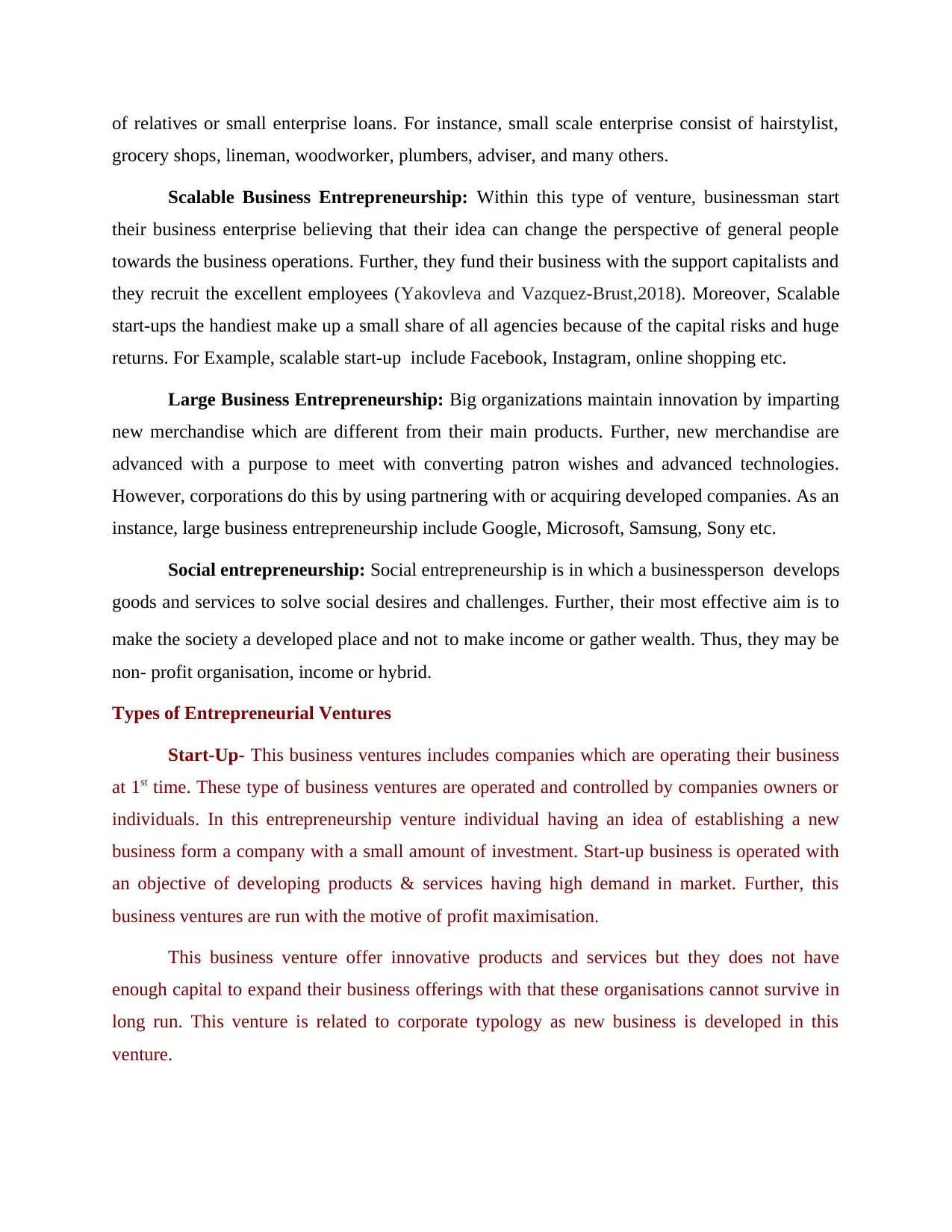
of relatives or small enterprise loans. For instance, small scale enterprise consist of hairstylist,
grocery shops, lineman, woodworker, plumbers, adviser, and many others.
Scalable Business Entrepreneurship: Within this type of venture, businessman start
their business enterprise believing that their idea can change the perspective of general people
towards the business operations. Further, they fund their business with the support capitalists and
they recruit the excellent employees (Yakovleva and Vazquez-Brust,2018). Moreover, Scalable
start-ups the handiest make up a small share of all agencies because of the capital risks and huge
returns. For Example, scalable start-up include Facebook, Instagram, online shopping etc.
Large Business Entrepreneurship: Big organizations maintain innovation by imparting
new merchandise which are different from their main products. Further, new merchandise are
advanced with a purpose to meet with converting patron wishes and advanced technologies.
However, corporations do this by using partnering with or acquiring developed companies. As an
instance, large business entrepreneurship include Google, Microsoft, Samsung, Sony etc.
Social entrepreneurship: Social entrepreneurship is in which a businessperson develops
goods and services to solve social desires and challenges. Further, their most effective aim is to
make the society a developed place and not to make income or gather wealth. Thus, they may be
non- profit organisation, income or hybrid.
Types of Entrepreneurial Ventures
Start-Up- This business ventures includes companies which are operating their business
at 1st time. These type of business ventures are operated and controlled by companies owners or
individuals. In this entrepreneurship venture individual having an idea of establishing a new
business form a company with a small amount of investment. Start-up business is operated with
an objective of developing products & services having high demand in market. Further, this
business ventures are run with the motive of profit maximisation.
This business venture offer innovative products and services but they does not have
enough capital to expand their business offerings with that these organisations cannot survive in
long run. This venture is related to corporate typology as new business is developed in this
venture.
grocery shops, lineman, woodworker, plumbers, adviser, and many others.
Scalable Business Entrepreneurship: Within this type of venture, businessman start
their business enterprise believing that their idea can change the perspective of general people
towards the business operations. Further, they fund their business with the support capitalists and
they recruit the excellent employees (Yakovleva and Vazquez-Brust,2018). Moreover, Scalable
start-ups the handiest make up a small share of all agencies because of the capital risks and huge
returns. For Example, scalable start-up include Facebook, Instagram, online shopping etc.
Large Business Entrepreneurship: Big organizations maintain innovation by imparting
new merchandise which are different from their main products. Further, new merchandise are
advanced with a purpose to meet with converting patron wishes and advanced technologies.
However, corporations do this by using partnering with or acquiring developed companies. As an
instance, large business entrepreneurship include Google, Microsoft, Samsung, Sony etc.
Social entrepreneurship: Social entrepreneurship is in which a businessperson develops
goods and services to solve social desires and challenges. Further, their most effective aim is to
make the society a developed place and not to make income or gather wealth. Thus, they may be
non- profit organisation, income or hybrid.
Types of Entrepreneurial Ventures
Start-Up- This business ventures includes companies which are operating their business
at 1st time. These type of business ventures are operated and controlled by companies owners or
individuals. In this entrepreneurship venture individual having an idea of establishing a new
business form a company with a small amount of investment. Start-up business is operated with
an objective of developing products & services having high demand in market. Further, this
business ventures are run with the motive of profit maximisation.
This business venture offer innovative products and services but they does not have
enough capital to expand their business offerings with that these organisations cannot survive in
long run. This venture is related to corporate typology as new business is developed in this
venture.
Paraphrase This Document
Need a fresh take? Get an instant paraphrase of this document with our AI Paraphraser
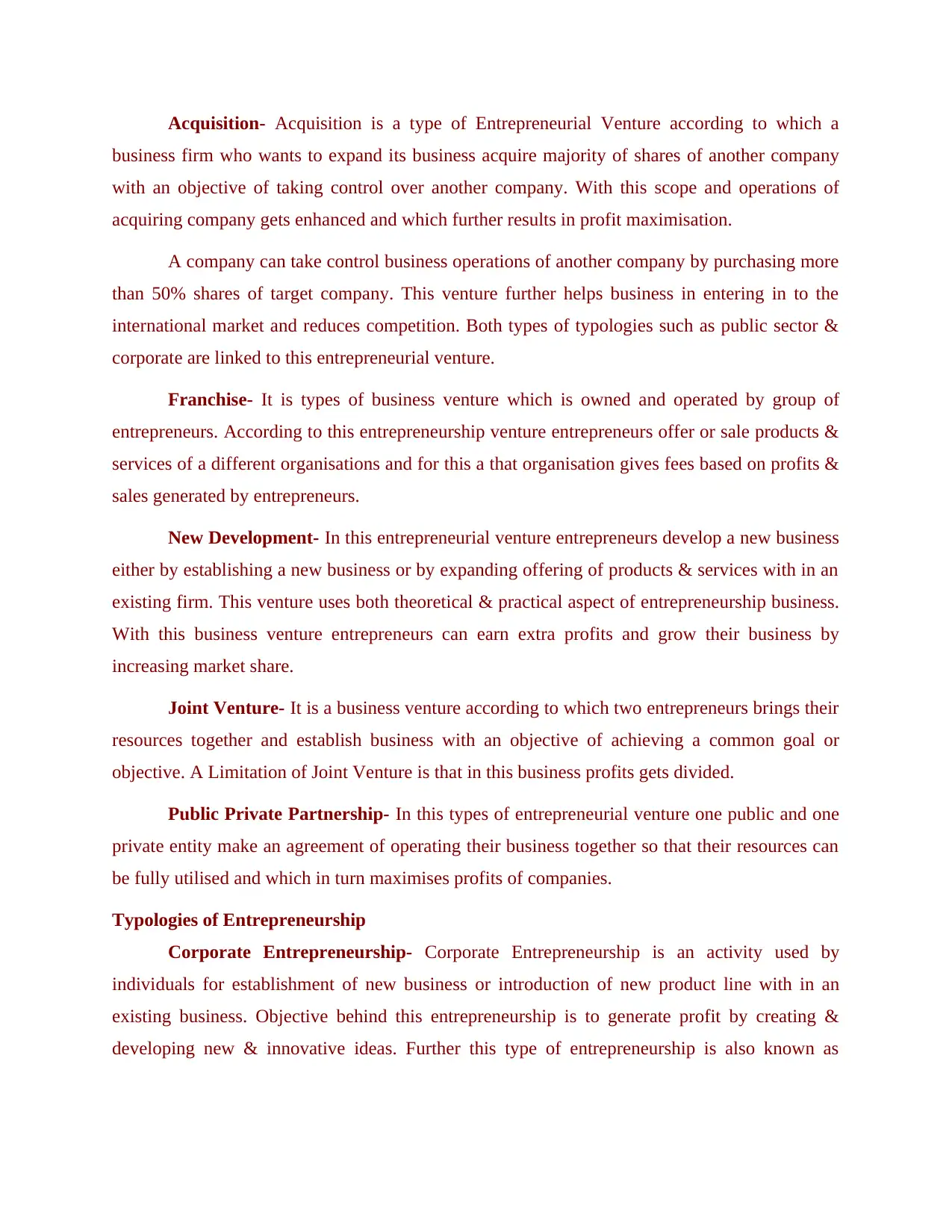
Acquisition- Acquisition is a type of Entrepreneurial Venture according to which a
business firm who wants to expand its business acquire majority of shares of another company
with an objective of taking control over another company. With this scope and operations of
acquiring company gets enhanced and which further results in profit maximisation.
A company can take control business operations of another company by purchasing more
than 50% shares of target company. This venture further helps business in entering in to the
international market and reduces competition. Both types of typologies such as public sector &
corporate are linked to this entrepreneurial venture.
Franchise- It is types of business venture which is owned and operated by group of
entrepreneurs. According to this entrepreneurship venture entrepreneurs offer or sale products &
services of a different organisations and for this a that organisation gives fees based on profits &
sales generated by entrepreneurs.
New Development- In this entrepreneurial venture entrepreneurs develop a new business
either by establishing a new business or by expanding offering of products & services with in an
existing firm. This venture uses both theoretical & practical aspect of entrepreneurship business.
With this business venture entrepreneurs can earn extra profits and grow their business by
increasing market share.
Joint Venture- It is a business venture according to which two entrepreneurs brings their
resources together and establish business with an objective of achieving a common goal or
objective. A Limitation of Joint Venture is that in this business profits gets divided.
Public Private Partnership- In this types of entrepreneurial venture one public and one
private entity make an agreement of operating their business together so that their resources can
be fully utilised and which in turn maximises profits of companies.
Typologies of Entrepreneurship
Corporate Entrepreneurship- Corporate Entrepreneurship is an activity used by
individuals for establishment of new business or introduction of new product line with in an
existing business. Objective behind this entrepreneurship is to generate profit by creating &
developing new & innovative ideas. Further this type of entrepreneurship is also known as
business firm who wants to expand its business acquire majority of shares of another company
with an objective of taking control over another company. With this scope and operations of
acquiring company gets enhanced and which further results in profit maximisation.
A company can take control business operations of another company by purchasing more
than 50% shares of target company. This venture further helps business in entering in to the
international market and reduces competition. Both types of typologies such as public sector &
corporate are linked to this entrepreneurial venture.
Franchise- It is types of business venture which is owned and operated by group of
entrepreneurs. According to this entrepreneurship venture entrepreneurs offer or sale products &
services of a different organisations and for this a that organisation gives fees based on profits &
sales generated by entrepreneurs.
New Development- In this entrepreneurial venture entrepreneurs develop a new business
either by establishing a new business or by expanding offering of products & services with in an
existing firm. This venture uses both theoretical & practical aspect of entrepreneurship business.
With this business venture entrepreneurs can earn extra profits and grow their business by
increasing market share.
Joint Venture- It is a business venture according to which two entrepreneurs brings their
resources together and establish business with an objective of achieving a common goal or
objective. A Limitation of Joint Venture is that in this business profits gets divided.
Public Private Partnership- In this types of entrepreneurial venture one public and one
private entity make an agreement of operating their business together so that their resources can
be fully utilised and which in turn maximises profits of companies.
Typologies of Entrepreneurship
Corporate Entrepreneurship- Corporate Entrepreneurship is an activity used by
individuals for establishment of new business or introduction of new product line with in an
existing business. Objective behind this entrepreneurship is to generate profit by creating &
developing new & innovative ideas. Further this type of entrepreneurship is also known as
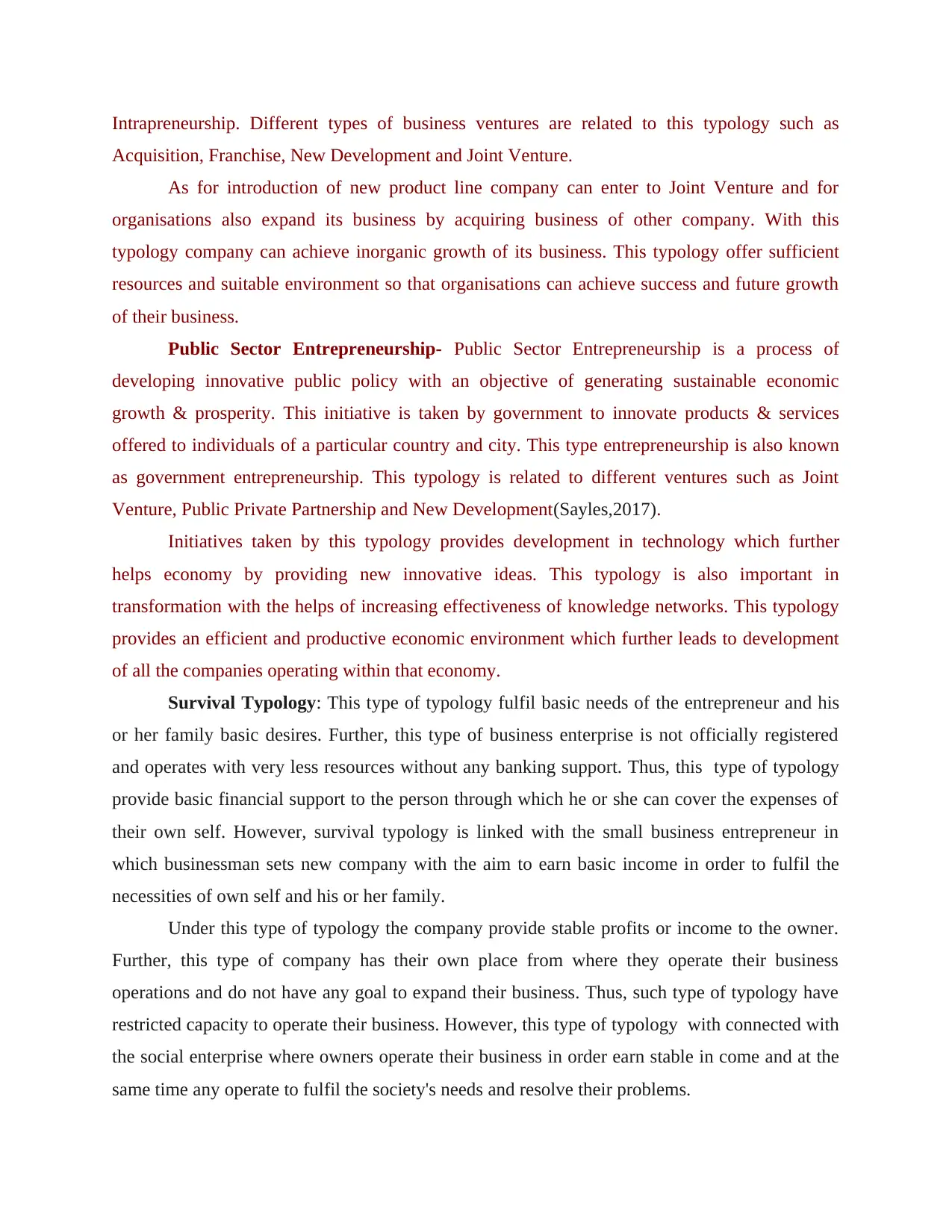
Intrapreneurship. Different types of business ventures are related to this typology such as
Acquisition, Franchise, New Development and Joint Venture.
As for introduction of new product line company can enter to Joint Venture and for
organisations also expand its business by acquiring business of other company. With this
typology company can achieve inorganic growth of its business. This typology offer sufficient
resources and suitable environment so that organisations can achieve success and future growth
of their business.
Public Sector Entrepreneurship- Public Sector Entrepreneurship is a process of
developing innovative public policy with an objective of generating sustainable economic
growth & prosperity. This initiative is taken by government to innovate products & services
offered to individuals of a particular country and city. This type entrepreneurship is also known
as government entrepreneurship. This typology is related to different ventures such as Joint
Venture, Public Private Partnership and New Development(Sayles,2017).
Initiatives taken by this typology provides development in technology which further
helps economy by providing new innovative ideas. This typology is also important in
transformation with the helps of increasing effectiveness of knowledge networks. This typology
provides an efficient and productive economic environment which further leads to development
of all the companies operating within that economy.
Survival Typology: This type of typology fulfil basic needs of the entrepreneur and his
or her family basic desires. Further, this type of business enterprise is not officially registered
and operates with very less resources without any banking support. Thus, this type of typology
provide basic financial support to the person through which he or she can cover the expenses of
their own self. However, survival typology is linked with the small business entrepreneur in
which businessman sets new company with the aim to earn basic income in order to fulfil the
necessities of own self and his or her family.
Under this type of typology the company provide stable profits or income to the owner.
Further, this type of company has their own place from where they operate their business
operations and do not have any goal to expand their business. Thus, such type of typology have
restricted capacity to operate their business. However, this type of typology with connected with
the social enterprise where owners operate their business in order earn stable in come and at the
same time any operate to fulfil the society's needs and resolve their problems.
Acquisition, Franchise, New Development and Joint Venture.
As for introduction of new product line company can enter to Joint Venture and for
organisations also expand its business by acquiring business of other company. With this
typology company can achieve inorganic growth of its business. This typology offer sufficient
resources and suitable environment so that organisations can achieve success and future growth
of their business.
Public Sector Entrepreneurship- Public Sector Entrepreneurship is a process of
developing innovative public policy with an objective of generating sustainable economic
growth & prosperity. This initiative is taken by government to innovate products & services
offered to individuals of a particular country and city. This type entrepreneurship is also known
as government entrepreneurship. This typology is related to different ventures such as Joint
Venture, Public Private Partnership and New Development(Sayles,2017).
Initiatives taken by this typology provides development in technology which further
helps economy by providing new innovative ideas. This typology is also important in
transformation with the helps of increasing effectiveness of knowledge networks. This typology
provides an efficient and productive economic environment which further leads to development
of all the companies operating within that economy.
Survival Typology: This type of typology fulfil basic needs of the entrepreneur and his
or her family basic desires. Further, this type of business enterprise is not officially registered
and operates with very less resources without any banking support. Thus, this type of typology
provide basic financial support to the person through which he or she can cover the expenses of
their own self. However, survival typology is linked with the small business entrepreneur in
which businessman sets new company with the aim to earn basic income in order to fulfil the
necessities of own self and his or her family.
Under this type of typology the company provide stable profits or income to the owner.
Further, this type of company has their own place from where they operate their business
operations and do not have any goal to expand their business. Thus, such type of typology have
restricted capacity to operate their business. However, this type of typology with connected with
the social enterprise where owners operate their business in order earn stable in come and at the
same time any operate to fulfil the society's needs and resolve their problems.
⊘ This is a preview!⊘
Do you want full access?
Subscribe today to unlock all pages.

Trusted by 1+ million students worldwide
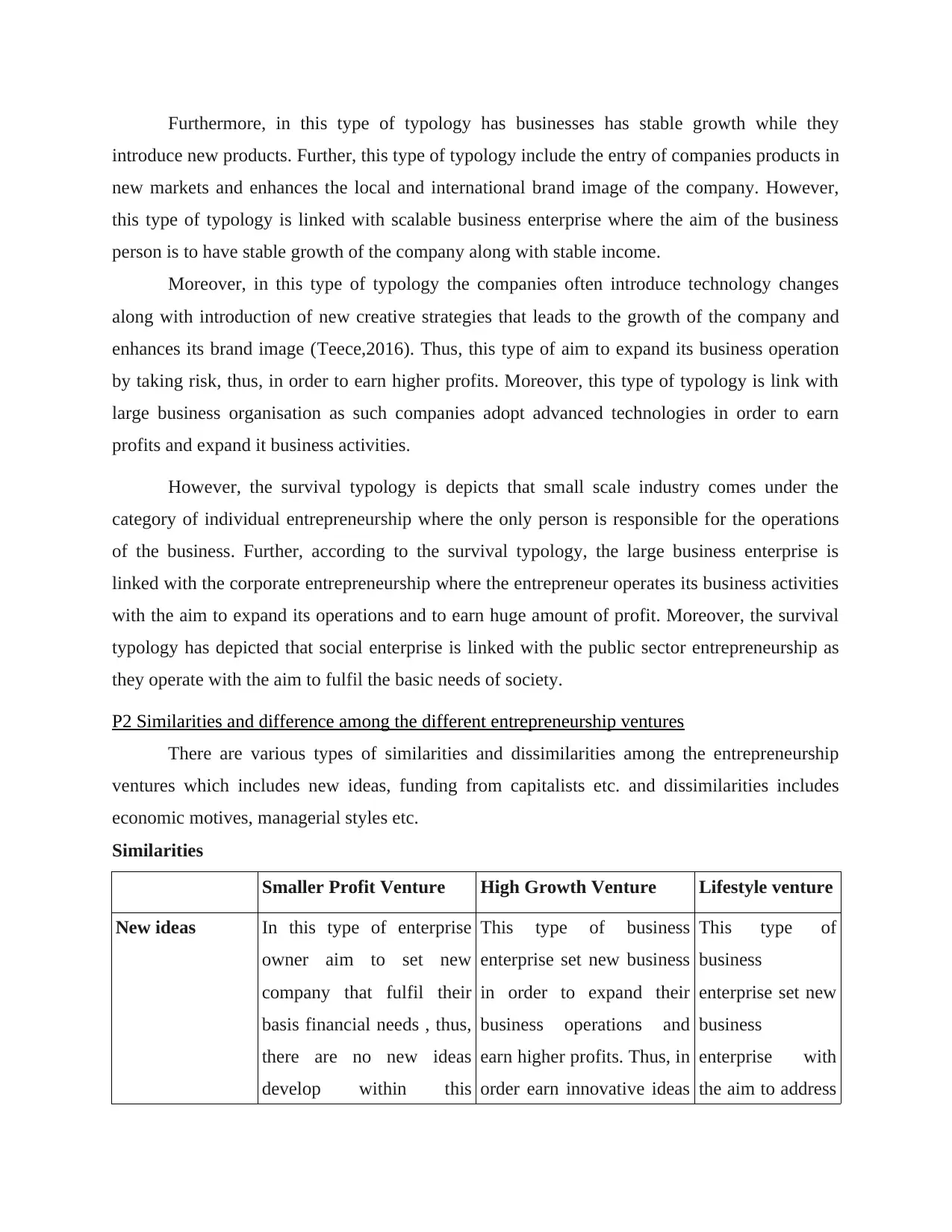
Furthermore, in this type of typology has businesses has stable growth while they
introduce new products. Further, this type of typology include the entry of companies products in
new markets and enhances the local and international brand image of the company. However,
this type of typology is linked with scalable business enterprise where the aim of the business
person is to have stable growth of the company along with stable income.
Moreover, in this type of typology the companies often introduce technology changes
along with introduction of new creative strategies that leads to the growth of the company and
enhances its brand image (Teece,2016). Thus, this type of aim to expand its business operation
by taking risk, thus, in order to earn higher profits. Moreover, this type of typology is link with
large business organisation as such companies adopt advanced technologies in order to earn
profits and expand it business activities.
However, the survival typology is depicts that small scale industry comes under the
category of individual entrepreneurship where the only person is responsible for the operations
of the business. Further, according to the survival typology, the large business enterprise is
linked with the corporate entrepreneurship where the entrepreneur operates its business activities
with the aim to expand its operations and to earn huge amount of profit. Moreover, the survival
typology has depicted that social enterprise is linked with the public sector entrepreneurship as
they operate with the aim to fulfil the basic needs of society.
P2 Similarities and difference among the different entrepreneurship ventures
There are various types of similarities and dissimilarities among the entrepreneurship
ventures which includes new ideas, funding from capitalists etc. and dissimilarities includes
economic motives, managerial styles etc.
Similarities
Smaller Profit Venture High Growth Venture Lifestyle venture
New ideas In this type of enterprise
owner aim to set new
company that fulfil their
basis financial needs , thus,
there are no new ideas
develop within this
This type of business
enterprise set new business
in order to expand their
business operations and
earn higher profits. Thus, in
order earn innovative ideas
This type of
business
enterprise set new
business
enterprise with
the aim to address
introduce new products. Further, this type of typology include the entry of companies products in
new markets and enhances the local and international brand image of the company. However,
this type of typology is linked with scalable business enterprise where the aim of the business
person is to have stable growth of the company along with stable income.
Moreover, in this type of typology the companies often introduce technology changes
along with introduction of new creative strategies that leads to the growth of the company and
enhances its brand image (Teece,2016). Thus, this type of aim to expand its business operation
by taking risk, thus, in order to earn higher profits. Moreover, this type of typology is link with
large business organisation as such companies adopt advanced technologies in order to earn
profits and expand it business activities.
However, the survival typology is depicts that small scale industry comes under the
category of individual entrepreneurship where the only person is responsible for the operations
of the business. Further, according to the survival typology, the large business enterprise is
linked with the corporate entrepreneurship where the entrepreneur operates its business activities
with the aim to expand its operations and to earn huge amount of profit. Moreover, the survival
typology has depicted that social enterprise is linked with the public sector entrepreneurship as
they operate with the aim to fulfil the basic needs of society.
P2 Similarities and difference among the different entrepreneurship ventures
There are various types of similarities and dissimilarities among the entrepreneurship
ventures which includes new ideas, funding from capitalists etc. and dissimilarities includes
economic motives, managerial styles etc.
Similarities
Smaller Profit Venture High Growth Venture Lifestyle venture
New ideas In this type of enterprise
owner aim to set new
company that fulfil their
basis financial needs , thus,
there are no new ideas
develop within this
This type of business
enterprise set new business
in order to expand their
business operations and
earn higher profits. Thus, in
order earn innovative ideas
This type of
business
enterprise set new
business
enterprise with
the aim to address
Paraphrase This Document
Need a fresh take? Get an instant paraphrase of this document with our AI Paraphraser

enterprise. are developed frequently. the society
problem and fulfil
their basic needs.
Thus, in order to
fulfil the society's
expectations the
owner develop
and improve their
services by
adopting new
ideas.
Funding From
Capitalist Or
Investor.
This type of business
entrepreneur fund their
company with the support
of friends or relative.
This types of business
enterprise fund their
business activities by
engaging in partnership
with other developed
companies or acquiring
higher growth companies
(Sayles, 2017).
This type of
business
enterprise fund
their business
activities with the
help their own
capital or the
investor or friends
who invests in
their business.
Differences
Smaller Profit Venture High Growth Venture lifestyle venture
Economic
Motives
The economic motive of
this type of business
enterprise is to fulfil their
basic needs and to support
their family financially
(Barringer, 2015).
The economic motive of
large business organisation
is to earn higher income
and profits and aim to
expand their business
operations.
The economic
motive of the
social enterprise
is to earn income
in order to fulfil
the society needs
problem and fulfil
their basic needs.
Thus, in order to
fulfil the society's
expectations the
owner develop
and improve their
services by
adopting new
ideas.
Funding From
Capitalist Or
Investor.
This type of business
entrepreneur fund their
company with the support
of friends or relative.
This types of business
enterprise fund their
business activities by
engaging in partnership
with other developed
companies or acquiring
higher growth companies
(Sayles, 2017).
This type of
business
enterprise fund
their business
activities with the
help their own
capital or the
investor or friends
who invests in
their business.
Differences
Smaller Profit Venture High Growth Venture lifestyle venture
Economic
Motives
The economic motive of
this type of business
enterprise is to fulfil their
basic needs and to support
their family financially
(Barringer, 2015).
The economic motive of
large business organisation
is to earn higher income
and profits and aim to
expand their business
operations.
The economic
motive of the
social enterprise
is to earn income
in order to fulfil
the society needs
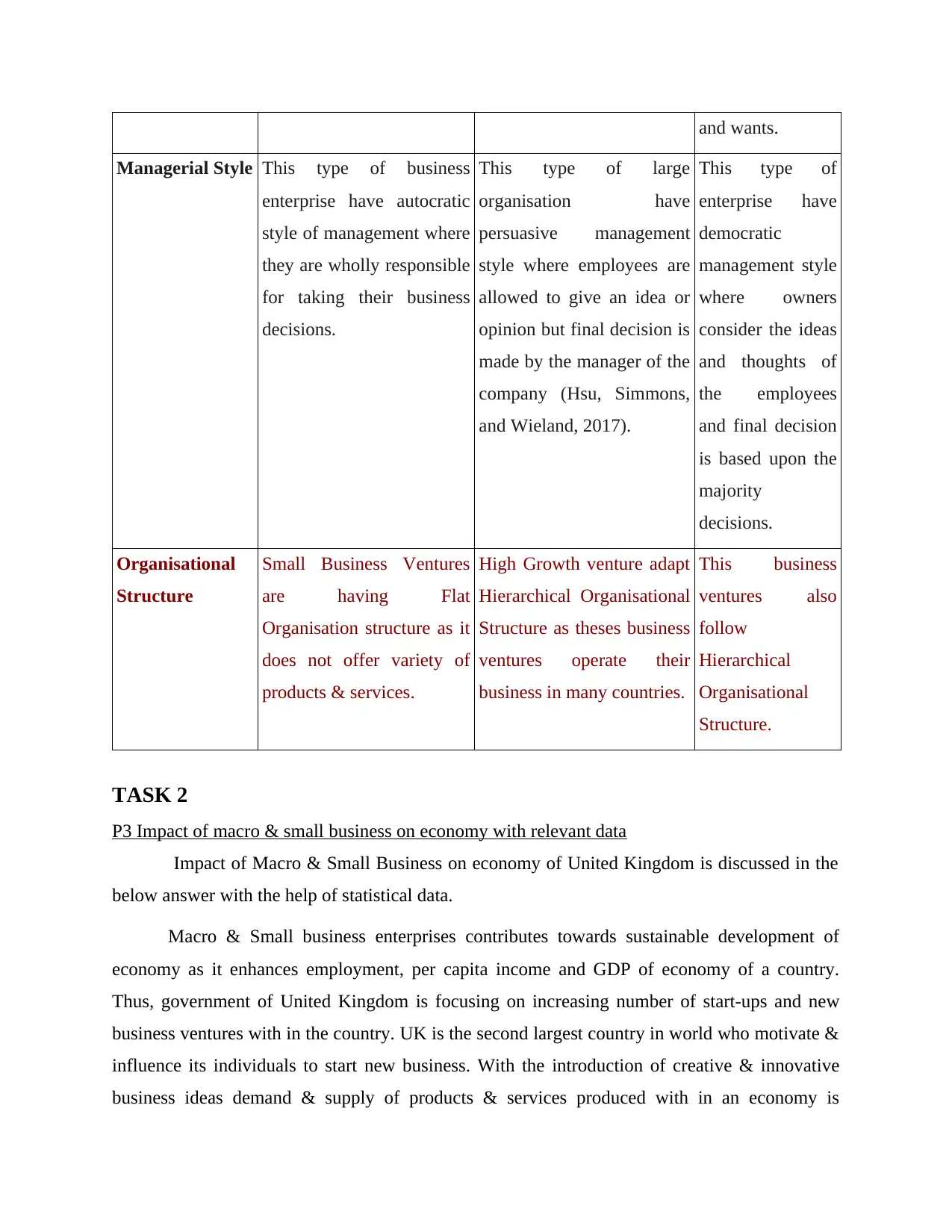
and wants.
Managerial Style This type of business
enterprise have autocratic
style of management where
they are wholly responsible
for taking their business
decisions.
This type of large
organisation have
persuasive management
style where employees are
allowed to give an idea or
opinion but final decision is
made by the manager of the
company (Hsu, Simmons,
and Wieland, 2017).
This type of
enterprise have
democratic
management style
where owners
consider the ideas
and thoughts of
the employees
and final decision
is based upon the
majority
decisions.
Organisational
Structure
Small Business Ventures
are having Flat
Organisation structure as it
does not offer variety of
products & services.
High Growth venture adapt
Hierarchical Organisational
Structure as theses business
ventures operate their
business in many countries.
This business
ventures also
follow
Hierarchical
Organisational
Structure.
TASK 2
P3 Impact of macro & small business on economy with relevant data
Impact of Macro & Small Business on economy of United Kingdom is discussed in the
below answer with the help of statistical data.
Macro & Small business enterprises contributes towards sustainable development of
economy as it enhances employment, per capita income and GDP of economy of a country.
Thus, government of United Kingdom is focusing on increasing number of start-ups and new
business ventures with in the country. UK is the second largest country in world who motivate &
influence its individuals to start new business. With the introduction of creative & innovative
business ideas demand & supply of products & services produced with in an economy is
Managerial Style This type of business
enterprise have autocratic
style of management where
they are wholly responsible
for taking their business
decisions.
This type of large
organisation have
persuasive management
style where employees are
allowed to give an idea or
opinion but final decision is
made by the manager of the
company (Hsu, Simmons,
and Wieland, 2017).
This type of
enterprise have
democratic
management style
where owners
consider the ideas
and thoughts of
the employees
and final decision
is based upon the
majority
decisions.
Organisational
Structure
Small Business Ventures
are having Flat
Organisation structure as it
does not offer variety of
products & services.
High Growth venture adapt
Hierarchical Organisational
Structure as theses business
ventures operate their
business in many countries.
This business
ventures also
follow
Hierarchical
Organisational
Structure.
TASK 2
P3 Impact of macro & small business on economy with relevant data
Impact of Macro & Small Business on economy of United Kingdom is discussed in the
below answer with the help of statistical data.
Macro & Small business enterprises contributes towards sustainable development of
economy as it enhances employment, per capita income and GDP of economy of a country.
Thus, government of United Kingdom is focusing on increasing number of start-ups and new
business ventures with in the country. UK is the second largest country in world who motivate &
influence its individuals to start new business. With the introduction of creative & innovative
business ideas demand & supply of products & services produced with in an economy is
⊘ This is a preview!⊘
Do you want full access?
Subscribe today to unlock all pages.

Trusted by 1+ million students worldwide
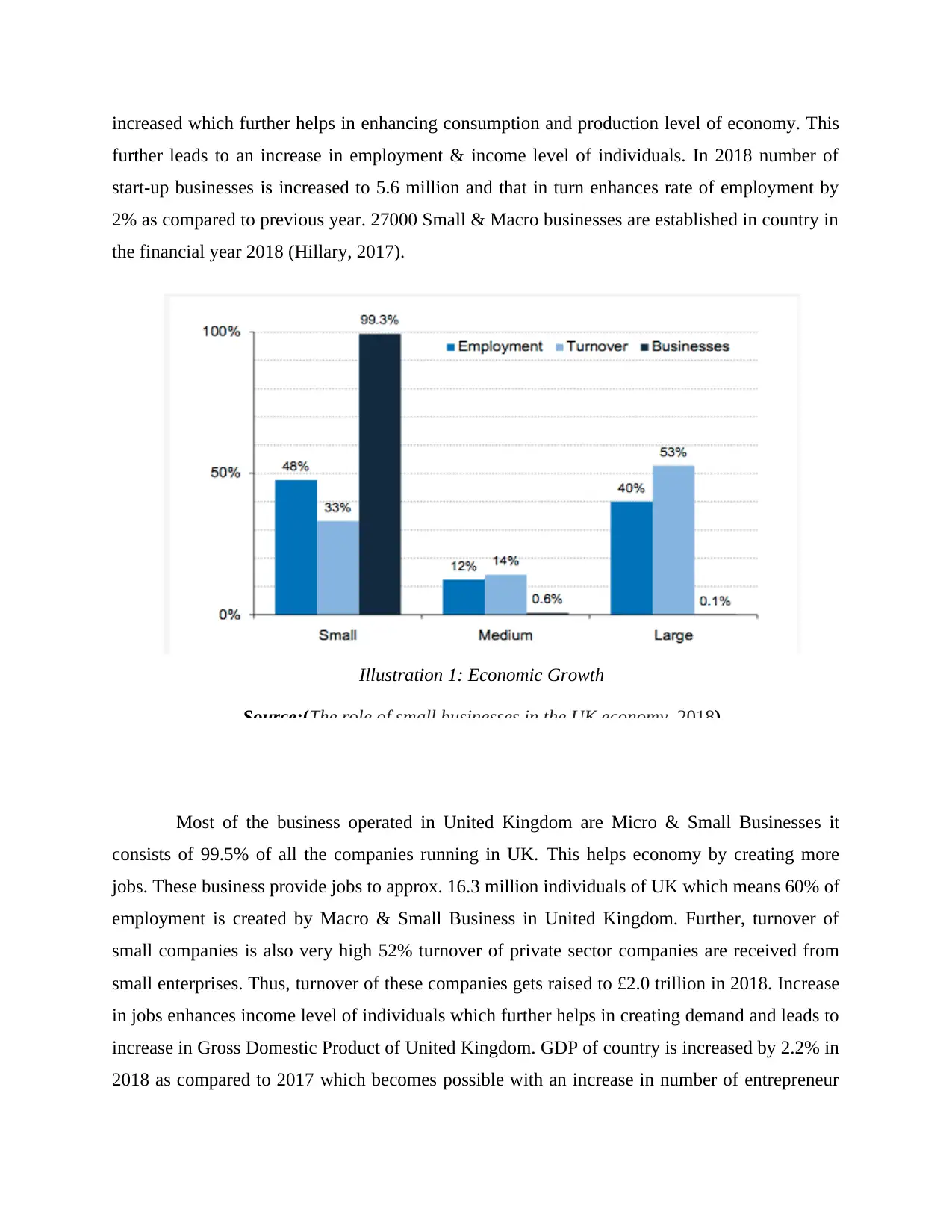
increased which further helps in enhancing consumption and production level of economy. This
further leads to an increase in employment & income level of individuals. In 2018 number of
start-up businesses is increased to 5.6 million and that in turn enhances rate of employment by
2% as compared to previous year. 27000 Small & Macro businesses are established in country in
the financial year 2018 (Hillary, 2017).
Most of the business operated in United Kingdom are Micro & Small Businesses it
consists of 99.5% of all the companies running in UK. This helps economy by creating more
jobs. These business provide jobs to approx. 16.3 million individuals of UK which means 60% of
employment is created by Macro & Small Business in United Kingdom. Further, turnover of
small companies is also very high 52% turnover of private sector companies are received from
small enterprises. Thus, turnover of these companies gets raised to £2.0 trillion in 2018. Increase
in jobs enhances income level of individuals which further helps in creating demand and leads to
increase in Gross Domestic Product of United Kingdom. GDP of country is increased by 2.2% in
2018 as compared to 2017 which becomes possible with an increase in number of entrepreneur
Illustration 1: Economic Growth
Source:(The role of small businesses in the UK economy. 2018)
further leads to an increase in employment & income level of individuals. In 2018 number of
start-up businesses is increased to 5.6 million and that in turn enhances rate of employment by
2% as compared to previous year. 27000 Small & Macro businesses are established in country in
the financial year 2018 (Hillary, 2017).
Most of the business operated in United Kingdom are Micro & Small Businesses it
consists of 99.5% of all the companies running in UK. This helps economy by creating more
jobs. These business provide jobs to approx. 16.3 million individuals of UK which means 60% of
employment is created by Macro & Small Business in United Kingdom. Further, turnover of
small companies is also very high 52% turnover of private sector companies are received from
small enterprises. Thus, turnover of these companies gets raised to £2.0 trillion in 2018. Increase
in jobs enhances income level of individuals which further helps in creating demand and leads to
increase in Gross Domestic Product of United Kingdom. GDP of country is increased by 2.2% in
2018 as compared to 2017 which becomes possible with an increase in number of entrepreneur
Illustration 1: Economic Growth
Source:(The role of small businesses in the UK economy. 2018)
Paraphrase This Document
Need a fresh take? Get an instant paraphrase of this document with our AI Paraphraser

business in country. Start-up businesses helps economy in grow in international market as
operations of different sectors operated with in the economy is increased(Shah, 2018).
High rate of growth is observed in manufacturing and professional sectors. Further it is
also observed that these companies are also investing in expansion & development of their
business. Economy of United Kingdom becomes most innovative & creative economy in the
world due to increase in number of start-up and small business in economy. This also helps
economy in its further growth & development.
To maximise number of new business government of UK is investing £725 million on
research & development which helps in creating new ideas and techniques. That further, leads to
enhancement of revenue of country. SME's also play a role in economic development as with the
increase in offerings sales turnover of countries also increasing which enhances profitability and
market share of small companies that in turn helps in overall economic development of country.
Thus, it is concluded that with introduction of SME's in United Kingdom overall
economic growth of country is positive and it also helpful for country in expansion of its
international trade as these small companies are making expansion and many enterprises are
entering into international market.
Illustration 2: Growth in Different Sector's
Source:(Essential Facts You Should Know about SMEs in the UK. 2016)
operations of different sectors operated with in the economy is increased(Shah, 2018).
High rate of growth is observed in manufacturing and professional sectors. Further it is
also observed that these companies are also investing in expansion & development of their
business. Economy of United Kingdom becomes most innovative & creative economy in the
world due to increase in number of start-up and small business in economy. This also helps
economy in its further growth & development.
To maximise number of new business government of UK is investing £725 million on
research & development which helps in creating new ideas and techniques. That further, leads to
enhancement of revenue of country. SME's also play a role in economic development as with the
increase in offerings sales turnover of countries also increasing which enhances profitability and
market share of small companies that in turn helps in overall economic development of country.
Thus, it is concluded that with introduction of SME's in United Kingdom overall
economic growth of country is positive and it also helpful for country in expansion of its
international trade as these small companies are making expansion and many enterprises are
entering into international market.
Illustration 2: Growth in Different Sector's
Source:(Essential Facts You Should Know about SMEs in the UK. 2016)
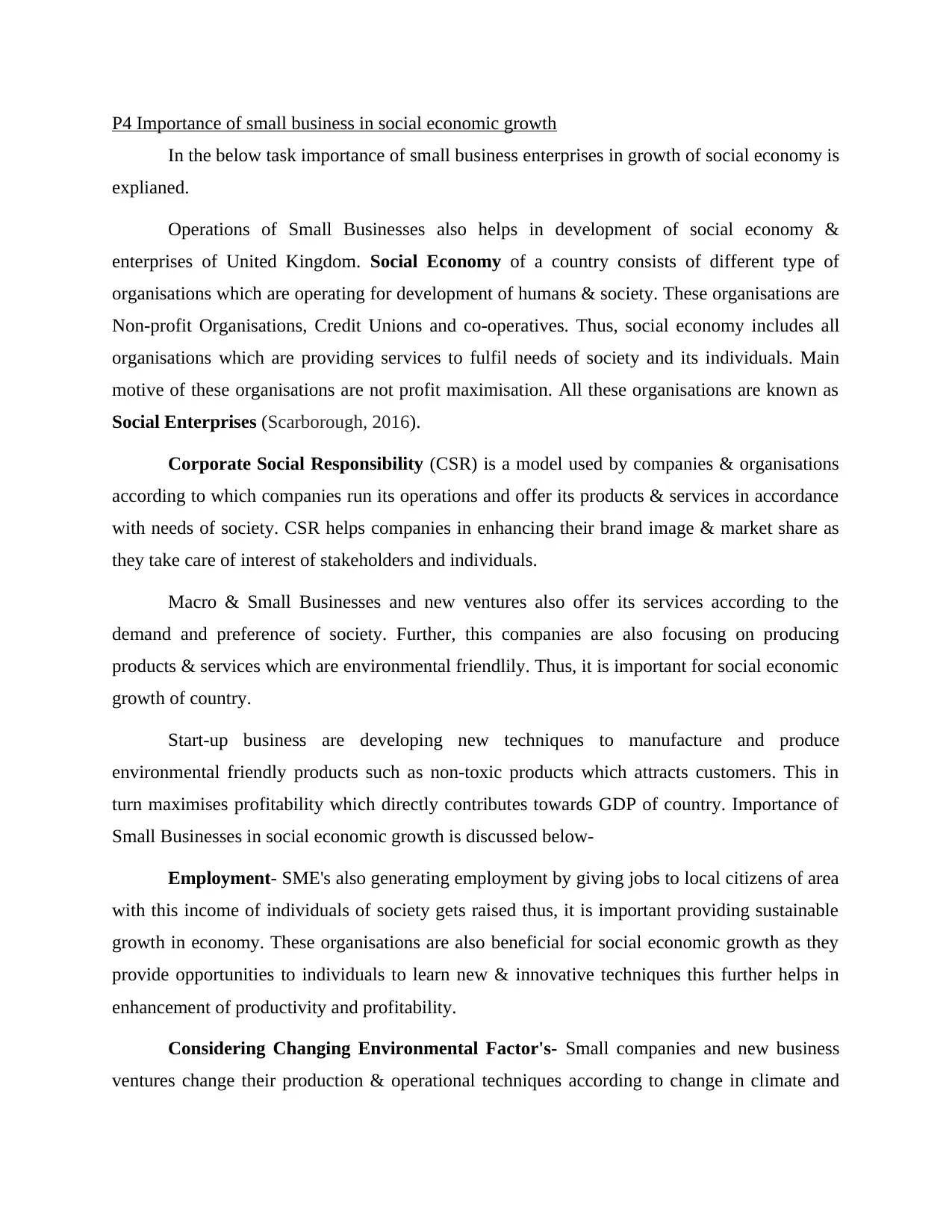
P4 Importance of small business in social economic growth
In the below task importance of small business enterprises in growth of social economy is
explianed.
Operations of Small Businesses also helps in development of social economy &
enterprises of United Kingdom. Social Economy of a country consists of different type of
organisations which are operating for development of humans & society. These organisations are
Non-profit Organisations, Credit Unions and co-operatives. Thus, social economy includes all
organisations which are providing services to fulfil needs of society and its individuals. Main
motive of these organisations are not profit maximisation. All these organisations are known as
Social Enterprises (Scarborough, 2016).
Corporate Social Responsibility (CSR) is a model used by companies & organisations
according to which companies run its operations and offer its products & services in accordance
with needs of society. CSR helps companies in enhancing their brand image & market share as
they take care of interest of stakeholders and individuals.
Macro & Small Businesses and new ventures also offer its services according to the
demand and preference of society. Further, this companies are also focusing on producing
products & services which are environmental friendlily. Thus, it is important for social economic
growth of country.
Start-up business are developing new techniques to manufacture and produce
environmental friendly products such as non-toxic products which attracts customers. This in
turn maximises profitability which directly contributes towards GDP of country. Importance of
Small Businesses in social economic growth is discussed below-
Employment- SME's also generating employment by giving jobs to local citizens of area
with this income of individuals of society gets raised thus, it is important providing sustainable
growth in economy. These organisations are also beneficial for social economic growth as they
provide opportunities to individuals to learn new & innovative techniques this further helps in
enhancement of productivity and profitability.
Considering Changing Environmental Factor's- Small companies and new business
ventures change their production & operational techniques according to change in climate and
In the below task importance of small business enterprises in growth of social economy is
explianed.
Operations of Small Businesses also helps in development of social economy &
enterprises of United Kingdom. Social Economy of a country consists of different type of
organisations which are operating for development of humans & society. These organisations are
Non-profit Organisations, Credit Unions and co-operatives. Thus, social economy includes all
organisations which are providing services to fulfil needs of society and its individuals. Main
motive of these organisations are not profit maximisation. All these organisations are known as
Social Enterprises (Scarborough, 2016).
Corporate Social Responsibility (CSR) is a model used by companies & organisations
according to which companies run its operations and offer its products & services in accordance
with needs of society. CSR helps companies in enhancing their brand image & market share as
they take care of interest of stakeholders and individuals.
Macro & Small Businesses and new ventures also offer its services according to the
demand and preference of society. Further, this companies are also focusing on producing
products & services which are environmental friendlily. Thus, it is important for social economic
growth of country.
Start-up business are developing new techniques to manufacture and produce
environmental friendly products such as non-toxic products which attracts customers. This in
turn maximises profitability which directly contributes towards GDP of country. Importance of
Small Businesses in social economic growth is discussed below-
Employment- SME's also generating employment by giving jobs to local citizens of area
with this income of individuals of society gets raised thus, it is important providing sustainable
growth in economy. These organisations are also beneficial for social economic growth as they
provide opportunities to individuals to learn new & innovative techniques this further helps in
enhancement of productivity and profitability.
Considering Changing Environmental Factor's- Small companies and new business
ventures change their production & operational techniques according to change in climate and
⊘ This is a preview!⊘
Do you want full access?
Subscribe today to unlock all pages.

Trusted by 1+ million students worldwide
1 out of 20
Related Documents
Your All-in-One AI-Powered Toolkit for Academic Success.
+13062052269
info@desklib.com
Available 24*7 on WhatsApp / Email
![[object Object]](/_next/static/media/star-bottom.7253800d.svg)
Unlock your academic potential
Copyright © 2020–2026 A2Z Services. All Rights Reserved. Developed and managed by ZUCOL.





